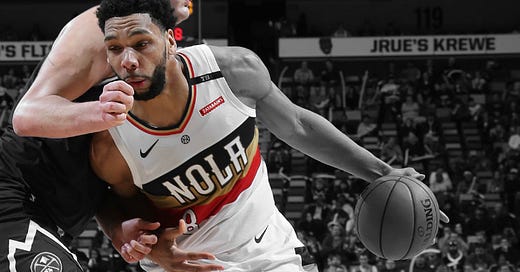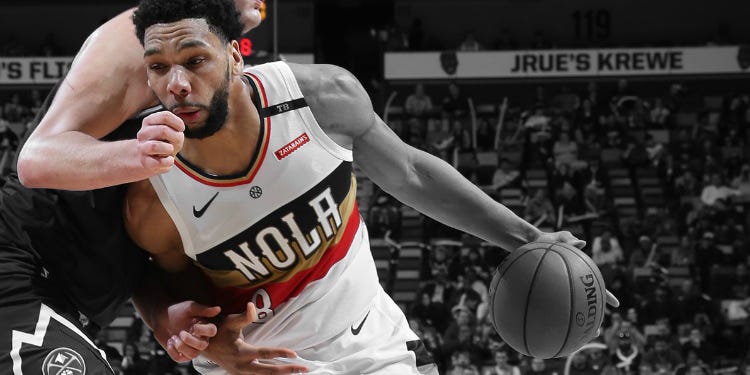Unterberger: Why Do We Still Care So Much About Jahlil Okafor Being Bad?
Does it really matter if Jahlil Okafor is still bad?
Andrew Unterberger is a famous writer who invented the nickname 'Sauce Castillo' and is now writing for The Rights To Ricky Sanchez, as part of the 'If Not, Pick Will Convey As Two Second-Rounders' section of the site. You can follow Andrew on Twitter @AUGetoffmygold and can also read him at Billboard.
Andrew's writing is brought to you by Kinetic Skateboarding! Not only the Ricky's approved skate shop, but the best place to get Chucks, Vans, any apparel. Use code "DAVESILVER" for 9.1% off your order.
Wednesday night, Process Trusters had to sweat through another statistically stellar half of play from Jahlil Okafor on the New Orleans Pelicans. Starting for the sixth straight game in the absence of injured (and disinvested) big man Anthony Davis, Okafor started the game 6-7 from the field, going into halftime with 12 points and four boards as the Pelicans entered the locker room with a three-point advantage over the second-seeded Denver Nuggets. But then Big Jah struggled to a 1-8 second half from the field, to go with two turnovers, as the Pels began to flail. He ended the game with 14 points on 7-15 shooting, no free throws, no assists, three TOs, a -11 plus/minus and a six-point Pelicans loss. Sixers fans could breathe easy: Jahlil Okafor was bad again.
FLY THE PROCESS: COME ON OUR TRIP TO MINNESOTA TO SEE ROCK AND DARIO
It’s been a trying five-game run for the Process Phaithful, watching the NBA world at large respond to Okafor’s seeming revitalization. Sixers fans can probably recite his stats over those five games from memory by now: 21.2 points, 11 boards, 75% from the field. He’s very briefly become the toast of the Internet, which has begun to rave about him being underrated, him being a building block, even possibly him serving as the superstar to replace Davis for New Orleans. “I’m not sure how you can do anything but root for Jahlil Okafor,” tweeted ESPN’s Myron Medcalf.
Tell you one way, Myron. For those of us who cheered on Jahlil for two years and change on the 76ers -- and “cheered on” would probably be more accurately expressed as “watched optimistically, then tolerated glumly, then prayed to be disposed of” -- doing anything but root for Jahlil Okafor comes pretty fucking easy. The wave of “Y’ALL THOUGHT HE WAS FINISHED?” momentum propping up Okafor on social media has been met with a veritable polar vortex of Sixer fan snark and smugness -- underlining his defensive laziness, his negative plus-minus, the Pelicans losing -- increasingly tinged with the unmistakable whiff of panic as the Bye Bye Lead Man’s numbers were getting a little too strong for a little too long for comfort. Could Okafor really be somewhat good after all? Were we too hard on him all these years?
Probably not, as last night’s second half provided a much-needed reminder of. But these questions prompt another question: Why do we still care so goddamn much? Nerlens Noel and Jerami Grant are thriving in Oklahoma City. Robert Covington and Dario Saric were slotting in nicely in Minnesota, before Cov got hurt and the entire thing went to shit (again). Hell, Evan Turner and Nik Stauskas found places in Portland, even if the latter’s role is a little tenuous. Lou Williams in L.A., Mikal Bridges in Phoenix, even Okafor’s new running partner Jrue Holiday in New Orleans -- everywhere you look, there are former Sixers thriving, and no one seems to take it as a personal attack. Why is Okafor the lone success we absolutely cannot abide?
Most of the reasoning can be tied to one specific and fairly obvious answer: He was bad when he was here. He was the fairly literal centerpiece of the 10-72 Sixers of ‘15-’16, the worst season the Sixers have had since they had the worst season in NBA history 43 years prior. His game was critically flawed, and despite various excuses that we (or at least the general media) made to explain why he would get better -- he needs better teammates, he needs to be in better shape, he needs to go vegan for some reason, he’s only 19 years old -- never actually made the difference when they ceased to be the case. He left Philly as one of the biggest draft busts the city had ever seen.
But it wasn’t just that he was bad: It was that he was deceptively bad. Putting up stats isn’t all that new or novel a concept for Okafor: Over the very first eight games of his career, he averaged 21 points and seven boards on 51% shooting. His numbers this past week-plus have been better, but hardly a world removed. But what they don’t show is his plodding feet on defense, his inability to make the right read out of double teams, his tendency to suffocate possessions with an outstretched palm gripping the basketball as the shot clock dwindled to nil. He would score on six out of nine possessions in the first quarter, and you’d look up and the other team would somehow still be up seven. But to the unobsessive eye, it looked like he was still putting in work -- a young Al Jefferson at the least, rolling out of bed with 20 and 10. It grew maddening.
And of course, there was off-court stuff too. He drunkenly slugged a guy in Boston. He did 108 on the Ben Franklin Bridge. He got into an altercation outside a club that resulted in a gun being pulled on him and the cops getting called. And once he and the Sixers finally parted ways in late 2017, he shaded the organization by praising his new Brooklyn Nets squad’s “actual NBA coaching staff,” complaining about his own poor conditioning being a result of the Sixers’ lack of proper trainers. It was all enough to make him definitively Process non grata by the end of his junior year in the Association.
But I think the investment in Okafor’s continued suckiness goes a little deeper than any of that. Evan Turner was just as disappointing and frustrating as a prospect. Nerlens Noel was a much bigger locker room malcontent. And somewhat needless to say, the most popular Sixer of the last quarter century -- until JoJo, at least -- could rack up a rap sheet in 24 hours to make Okafor’s combined malfeasances seem like standing on the left side of the escalator by comparison. None of these guys had Sixers fans box score watching in the same way after they moved on, leaving us ready to jump down the throats of anyone who had the temerity and/or the ignorance to suggest they might actually be good now.
I’d say the biggest sticking point with Jah is that thing at the core of all Sixers-related arguments: Our unquenchable desire to prove that we, as always, were right. While Noel, Turner and others arrived to the Sixers with high expectations that we believed they’d have a pretty good chance of meeting, there was skepticism about Okafor from the night he was drafted -- how he’d fit, how he’d develop, whether he was even the best prospect on his own Duke championship team. There always seemed to be something off about his selection, to the point where many of us assumed Our Once and Always Dark Lord Sam Hinkie drafted him merely to deal him to a team we could fleece on draft night, or shortly after. When that trade never materialized, we looked pleadingly to Okafor to prove our suspicions wrong. We would never doubt ourselves again.
For Jah to suddenly be good now would shake us to our very core. Not only would it be a slap in the face for a player we wasted a No. 3 pick on and had to attach a draft pick to get rid of two seasons later -- and by “had to” I of course mean “chose to for reasons that remain eternally unjustifiable” -- to randomly decide to figure it all out, it would also undo what has essentially become one of the core beliefs of the Process: That Jahlil Okafor has always stunk and will always stink. It’s something we feel in our bones, something that we’re nearly as certain of as Joel being awesome. For him to be a productive player and/or a legitimate blue chip prospect again would make us as captial-w Wrong as we’ve ever been as Sixers fans -- as Wrong as a beat writer suggesting it was malpractice for the team not to sign a veteran point guard for Ben Simmons to learn from as a rookie, as Wrong as the guy at your office who thought they should’ve gone after Jamal Crawford in the offseason, as Wrong as Bryan Colangelo thinking it shrewd to trade up for a Latvian big man still decades away from being NBA-ready. And this many years into the Process, that’s too wrong for any of us to stand being.
It’s not personal with Jah -- I don’t think so, anyway. He might not have done much to endear himself to Sixers fans, but none of his transgressions were particularly unforgivable, and the Sixers didn’t exactly do him any favors by drafting him with the No. 3 pick just to ultimately be No. 3 on our depth chart, and then bungling any attempt to deal him for years. He never should have ended up on the Sixers, and we should’ve never ended up with him. But he did and we did, and for two years we had no choice to scream “WHY ARE YOU LIKE THIS” at our televisions as he proved himself to be what we always thought he was.
It’s understandable that those who were spared having to spend that quality time with Okafor over his first two seasons would take his recent hot streak at face value. There’s not much we can do about the avalanche of All Jahlil Okafor Needed Was a Team to Believe in Him profiles we’re about to get snowed in by, featuring Jah offering thinly veiled disdain for the Process Years in Philly and the squad he left behind, and expressing his gratitude at finding a team that finally just lets him do what he does on the basketball court. We’ll just have to grit our teeth through them, secure in the knowledge that we know the player who Jahlil Okafor really was, and who he still remains. Probably, anyway.








